Ally 4 Health Introductory Video
(Download to View Video)
Stem Cell Research
Autism:
Back/ Spinal Injury:
COPD:
Erectile Dysfunction:
Inner Ear:
Lyme Disease:
Meniere’s Disease:
Musculoskeletal:
Parkinson’s Disease:
Peripheral Neuropathy:
Stroke:
LDN Research
https://www.mskcc.org/cancer-care/integrative-medicine/herbs/low-dose-naltrexone
https://www.ncbi.nlm.nih.gov/pmc/articles/PMC3962576/
https://ldnresearchtrust.org/what-is-low-dose-naltrexone-ldn
Mistletoe IV Therapy
IV-C Therapy
Vitamin C is one of the best antiviral agents available, with the ability to neutralize and eliminate a wide range of toxins. Vitamin C will enhance host resistance, greatly augmenting the immune system’s ability to neutralize bacterial and fungal infections (https://riordanclinic.org/what-we-do/high-dose-iv-vitamin-c/). Intravenous Vitamin C benefits to those suffering with conditions such as: Arthritis, Lyme disease, bacterial infections, viral infections, pain after injury, and more. With IV Vitamin C, cancer patients report having reduction in their pain level and are better able to tolerate chemotherapy. More benefits from IV Vitamin C include:
- Lessens pain after injuries
- Helps the body heal faster
- Improves energy levels/fatigue
- Resiliency to infections like colds/flu or other viral/bacterial infections
- In cancer patients, IVC is known to improve the response to cancer therapies because it alleviates the effects of traditional therapies, improves appetite and helps patients remain more active
Glutathione
What is Glutathione?
Glutathione, also known as GSH, is a molecule found naturally in your body. It is produced by the liver and nerve cells in the central nervous system. Glutathione is made up of three amino acids: L-cysteine, glycine, and L-glutamate.
It is an antioxidant, a molecule that helps fight free radicals. Free radicals are unstable molecules that form in response to factors like your diet and the environment. When more free radicals exist than antioxidants, oxidative cell damage occurs. This can lead to inflammation and a variety of health issues ranging from high blood pressure and diabetes to Alzheimer’s disease and more. https://www.peptidesciences.com/blog/what-is-glutathione
Foods with High Levels of Glutathione:
- Turmeric
- Avacado
- Green Asparagus
- Almonds
- Okra
- Broccoli

What have Research Studies Shown?
Antioxidant activity
• Prevent cancer progression
• Reduce cell damage in liver disease
• Improve insulin sensitivity
• Reduce symptoms of Parkinson’s disease
• Reduce ulcerative colitis damage
• Treating autism spectrum disorders
• Direct chemical neutralization of singlet oxygen, hydroxyl radicals, and superoxide radicals
• Cofactor for several antioxidant enzymes
• Regeneration of vitamins C and E
• Neutralization of free radicals produced by Phase I liver metabolism of chemical toxins
• One of approximately 7 liver Phase II reactions, which conjugate the activated intermediates produced by Phase I to make them water soluble for excretion by the kidneys
• Transportation of mercury out of cells and the brain
• Regulation of cellular proliferation and apoptosis
• Vital to mitochondrial function and maintenance of mitochondrial DNA (mtDNA)
Peptides
AO Scan Body Analyzer
Issues the AO Scan can address include:
- Allergies / Sensitivities
- Bacterial Diseases
- Blood Panels / CBC Report
- Reproductive Function
- Bone & Muscle Condition
- Cardiovascular Issues
- Chakras
- Heavy Metals
- Viruses
- Vitamins / CoEnzymes
- Digestive / Gastrointestinal Function
- Fungus / Mold
- Genetics
- Immune System
- Insulin Resistance
- Major Organ Function
- Parasites
- Thyroid Function
Modalities Used in an AO Body Scan:
Bio Resonance Recognition: This process transmits a specific signal from the brain through a pair of small transducers placed in the front of each ear into the system. This is what enables the brain to identify which part of the body is being scanned.
Bio Resonance Comparison: This process receives from the brain the resonating frequency of the part of the body that was selected and is then compared to a known homeostatic frequency that the selected organ, tissue, etc. should be vibrating at if healthy.Then it compares the two frequencies, calculates how close they are to each other, and assigns a number from 1 to 9, with 5 being in perfect harmony and higher or lower than 5 indicating either stress or under activity.
Sympathetic Vibratory Physics: This process involves sending a Sympathetic Vibration back into the body to encourage the organ, tissue, etc. that is not within their homeostatic range to move back towards the ideal range.
AO Infinity Wand
The Terahertz frequencies in the Infinity Wand boosts your immune system, increases the metabolic activity in the cells, increases cellular oxygenation, as well as increases blood flow.
Benefits of Terahertz in the AO Infinity Wand include:
- Energy Enhancement:
This device boosts your body’s natural energy levels, helping you feel revitalized and more active throughout the day.
- Stress Reduction:
Assist in reducing stress and promoting relaxation, improving overall mood and well-being.
- Pain Relief:
Provides targeted relief for aches and pains, whether from chronic conditions or everyday strains.
- Enhanced Healing:
Supports the body’s natural healing processes, aiding quicker recovery from injuries and illnesses.
- Improved Circulation:
Promotes better blood flow, essential for overall health and vitality.
- Detoxification:
Assists in eliminating toxins, enhancing your body’s natural detox processes.
Foods that Increase Dopamine
- Fish: Fish are rich in protein which also makes them rich in various amino acids. Amino acids have been proven to aid the production of dopamine in the body.
- Poultry: Similar to fish and other high-protein foods, poultry meats are high in amino acids. Along with this, they also help boost dopamine without promoting appetite.
- Dairy Products: Dairy products such as milk, cheese, yogurt, etc. are a great source of amino acids for vegetarians. Cheese and yogurt in particular greatly boost the production of happy hormones in the body.
- Strawberries: Strawberries not only boost the production of dopamine but serotonin as well. Strawberries are also a great source of antioxidants that shield the body from external radicals hence promoting good overall health. Although various other fruits have been proven to boost dopamine production.
- Green Leafy Vegetables: Green leafy vegetables scientifically called the cruciferous vegetable group consists of lettuce, spinach, cabbage, kale, cauliflower, broccoli, and many more. They act as great dopamine boosters for vegans.
- Green Tea: Green tea is a great beverage if you wish to increase your dopamine levels naturally. Green tea is high in caffeine which boosts our energy levels. Along with this, it also boosts our metabolism. It is also rich in antioxidants and promotes better overall health.
- Eggs: Eggs are considered superfoods for a reason. Eggs are very rich in amino acids as well as other nutrients that aid in the production of dopamine in the body.
- Nuts: Nuts are another great source of amino acids, especially for vegans and vegetarians. As they are also rich in other nutrients it is a great addition to your diet if you naturally want to boost the production of happy hormones.
Anti-Inflammatory Diet
Anti-Inflammatory Foods
- Fruits and Vegetables: Colorful fruits and vegetables contain natural antioxidants and polyphenols. These are chemicals in plants that guard against inflammation. Research shows that vitamin K-rich leafy greens like spinach and kale, berries, and yellow and orange fruits and vegetables may be particularly protective.
- Whole Grains: The fiber in oatmeal, brown rice, whole wheat bread, and other whole grains may help with inflammation.
- Beans: They’re high in fiber. Plus they’re loaded with antioxidants and other anti-inflammatory substances.
- Tofu and Tempeh: Soy-based products are high in polyunsaturated fat, fiber, calcium, and vitamins but low in saturated fat. Studies suggest people who eat soy-based foods have lower odds of inflammation-related diseases like heart disease, diabetes, and some cancers.
- Nuts and Legumes: Tree nuts like almonds and walnuts, along with peanuts, are rich in unsaturated fats, along with anti-inflammatory vitamins and minerals.
- Fish: Fatty fish like salmon, tuna, and sardines are packed with anti-inflammatory omega-3 fatty acids.
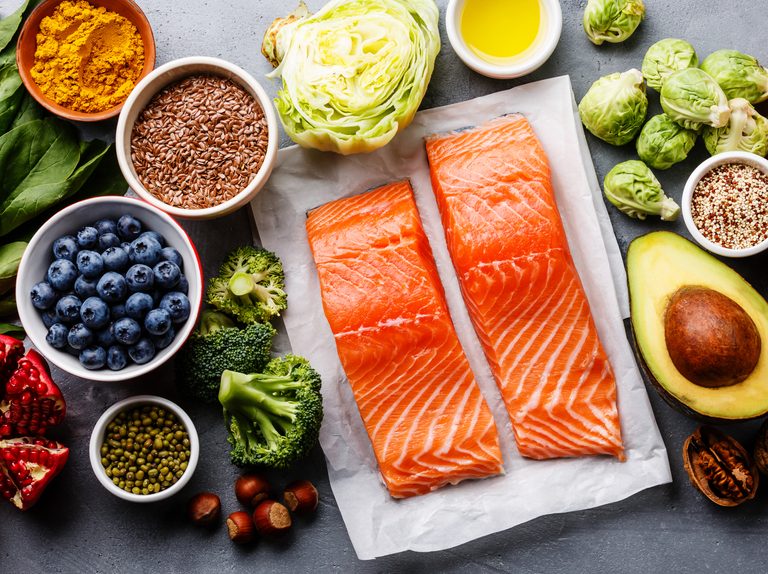
Anti-Inflammatory Herbs and Spices
*You can add flavor to your meals with dry or fresh herbs and spices. Some also come in the form of teas, oil extracts, powders, and pills.*
- Black Pepper
- Cardamom
- Cinnamon
- Clove
- Cumin
- Curcumin (has the most anti-inflammatory research)
- Fenugreek
- Fennel
- Garlic
- Ginger
- Onion
- Rosemary
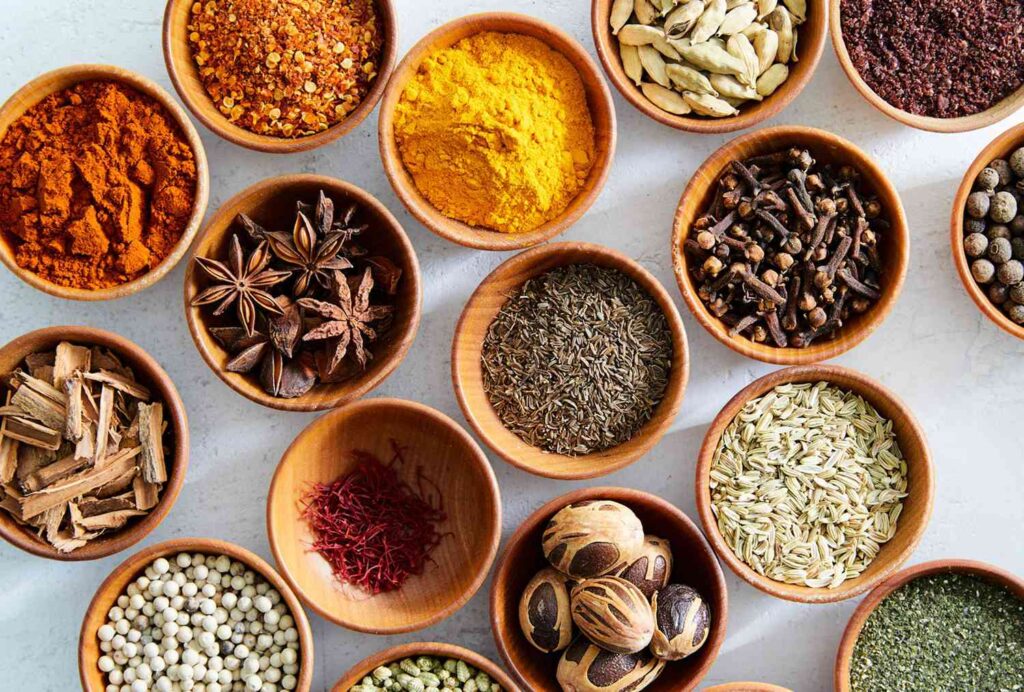
Anti-Inflammatory Drinks
- Tea: Green, white, and black teas obtain polyphenols, which are a strong antioxidant. Green and white teas have the MOST anti-inflammatory effects.
- Coffee: Similar to tea, coffee contains antioxidants and caffeine.
- Green Smoothies: Drink your fruits and vegetables in a blended form. You can blend berries along with leafy greens such as spinach or kale with a non-dairy or low-fat milk to get an anti-inflammatory boost.
- Water: Adequate water supply increases hydration and our ability to fight inflammation by flushing out toxins.
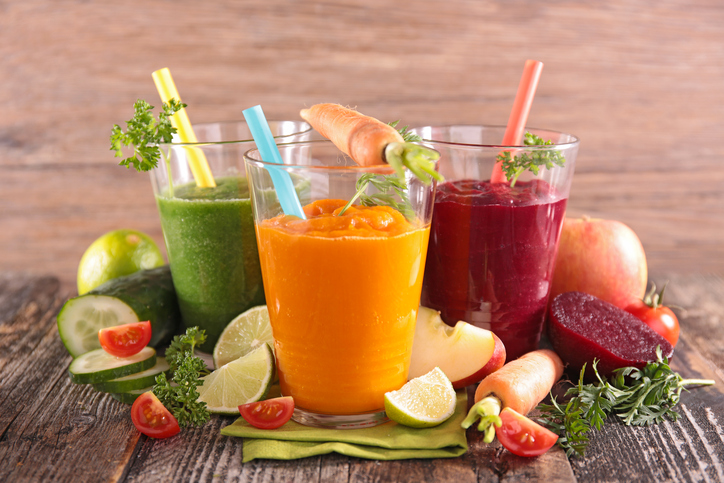
Foods to AVOID that Increase Inflammation
- Sweets, cakes, cookies, and soda
- Red and processed meat
- Butter, whole milk, and cheese
- Fried foods
- Anything with trans fats
What Conditions Can an Anti-Inflammatory Diet Help?
- Autoimmune Disease
- Inflammatory Bowel Disease (IBD)
- Cardiovascular Disease
- Allergies and Asthma
- Alzheimer’s Disease and Other Dementias
Juicing
Wheatgrass Juice:
- Drink two freshly squeeze ounces per day for an extended time, if not always.
- You can also use the juice or pulp of implants, bathing, poultices, etc.
Benefits of Juicing Wheatgrass:
- High in nutrients and antioxidants
- May reduce cholesterol
- Could help kill cancer cells
- Aid in blood sugar regulation
- Alleviate inflammation
- Promote weight loss
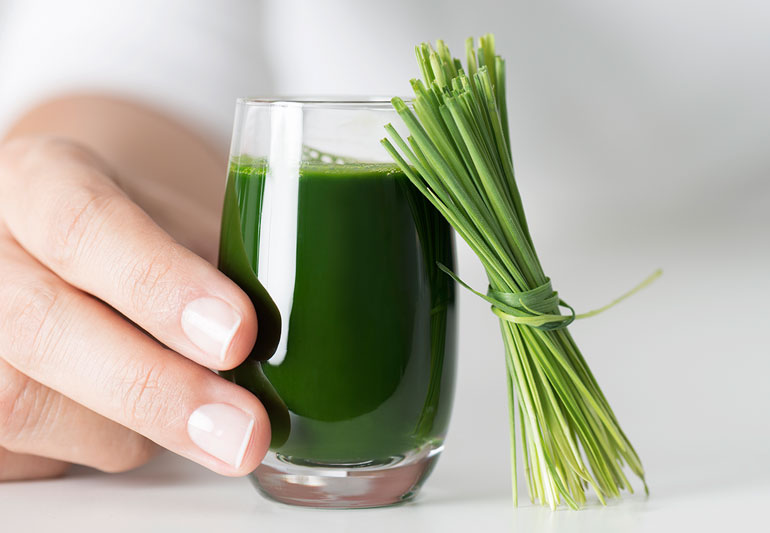
Green Drinks:
- Green drinks are mixtures of freshly squeeze juices, 50% sprouts (pee or sunflower) and 50% vegetable (25% cucumber + 25% celery).
- Drink at least two green drinks per day for the rest of your life.
- Drink on an empty stomach and do not eat for 15-30 minutes afterwards.
Benefits of Green Drinks:
- Improve gut health
- Reduce inflammation
- Strengthen immune system
- Hydrate skin
- Boost energy levels
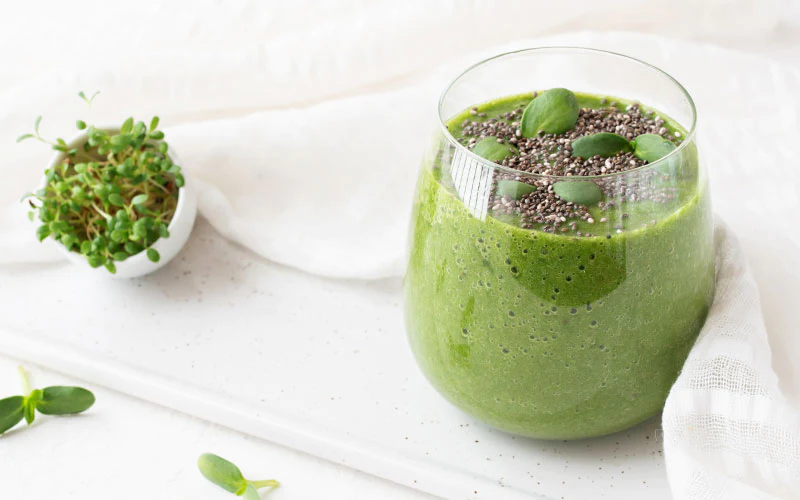
What Helps with Sleep?
Supplements
*Visit the Shop page to see prices, directions and benefits*
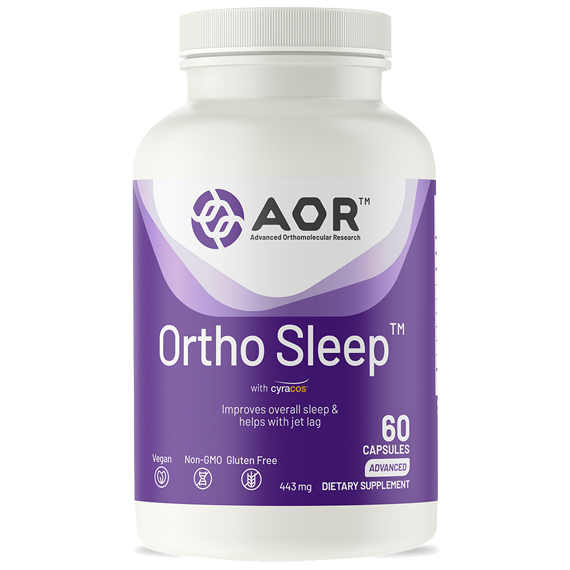
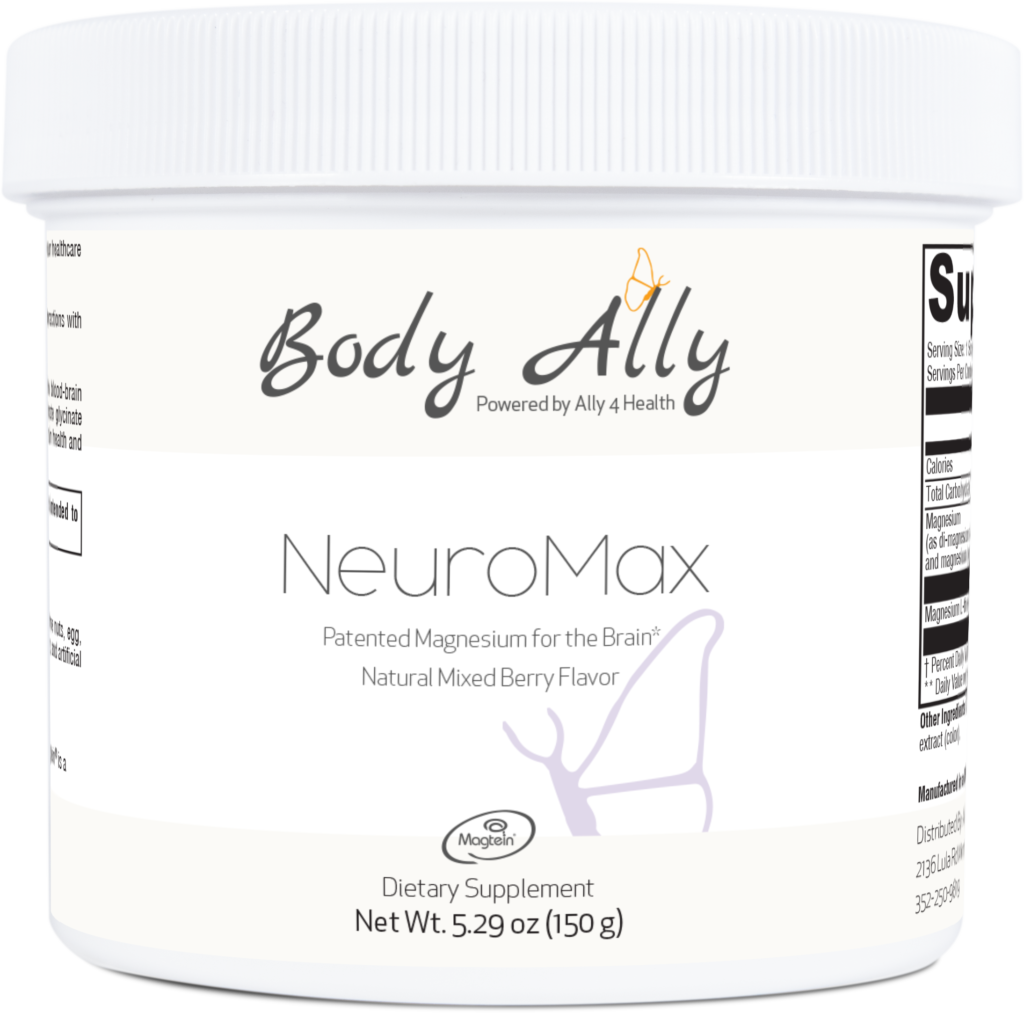
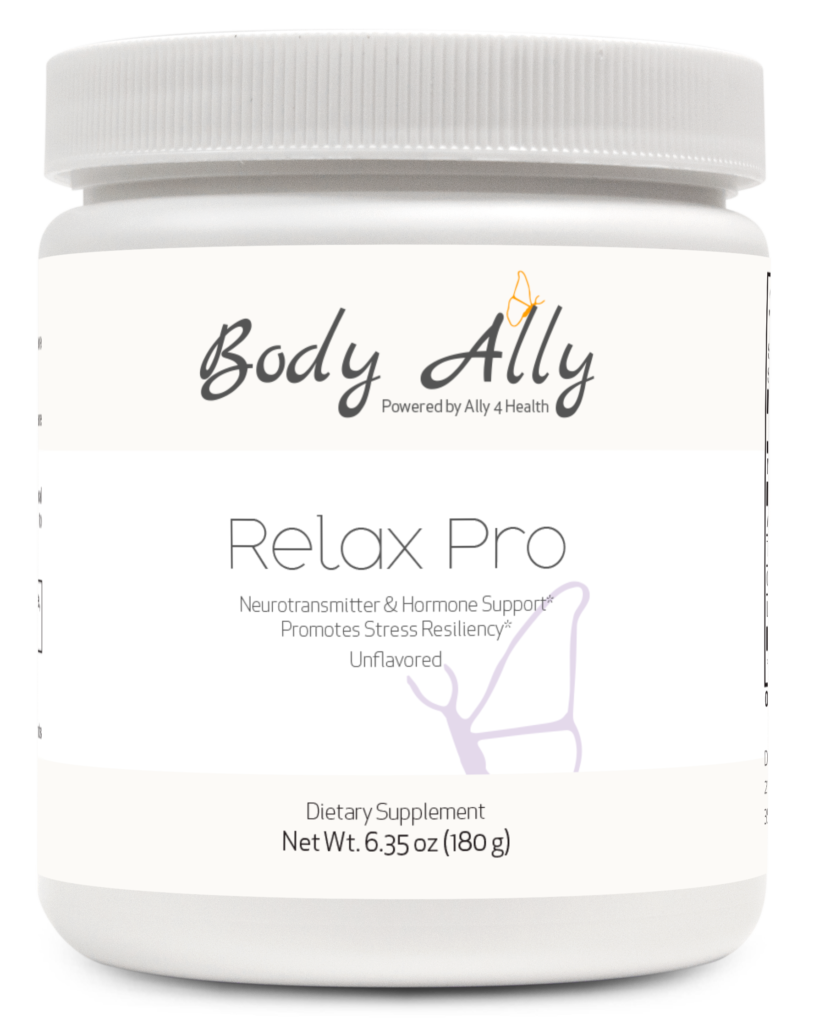
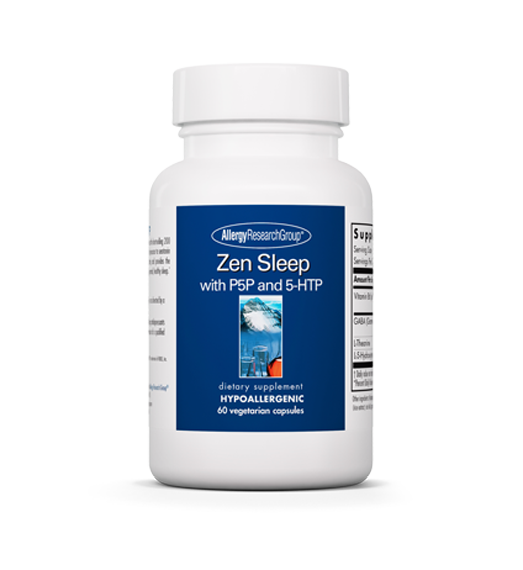
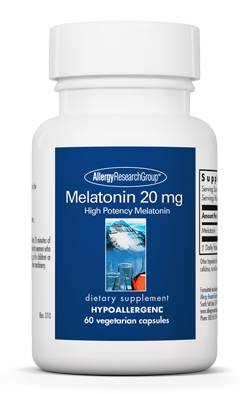
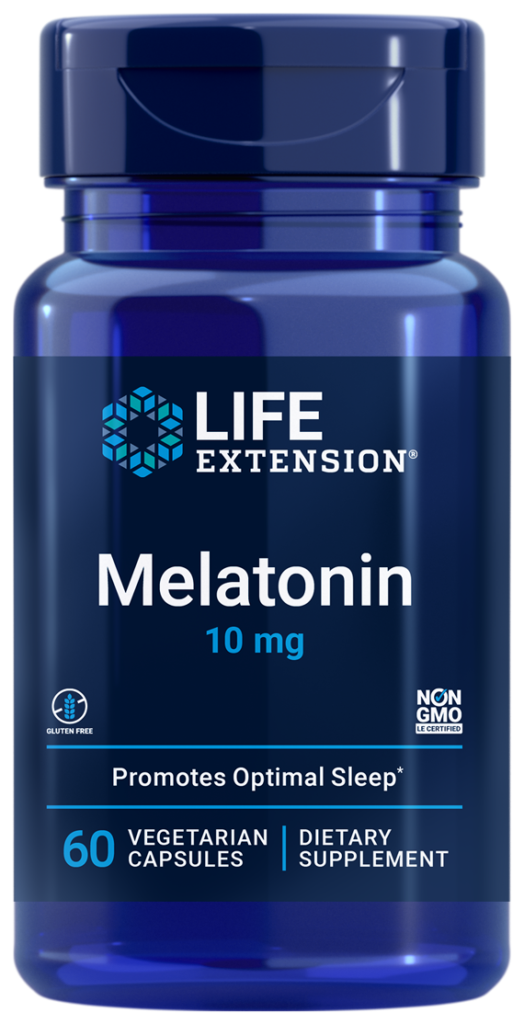
Other
- Hormone Regulation
- Meditation
- Exercise (yoga, pilates, etc.)
